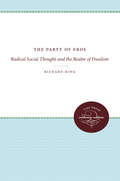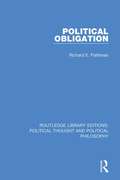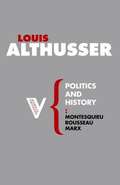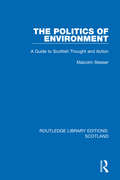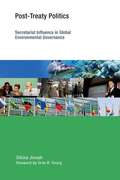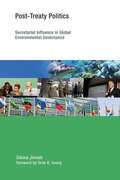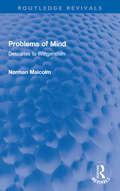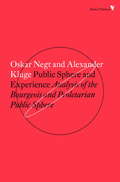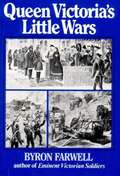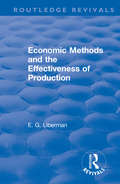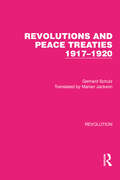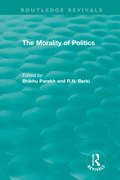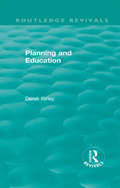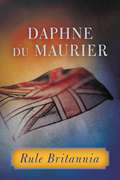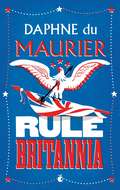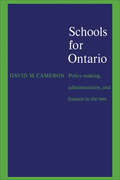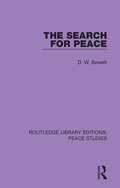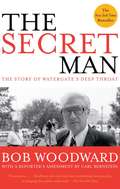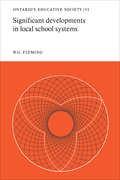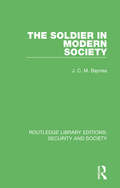- Table View
- List View
The Party of Eros: Radical Social Thought and the Realm of Freedom
by Richard KingIn this provocative study, the author treats Goodman, Marcuse, and Brown as the three most important radical social theorists in America since the end of World War II. His reasoned conclusions will attract anyone interested in the nonpolitical background of today's radical social thought.Originally published 1972.A UNC Press Enduring Edition -- UNC Press Enduring Editions use the latest in digital technology to make available again books from our distinguished backlist that were previously out of print. These editions are published unaltered from the original, and are presented in affordable paperback formats, bringing readers both historical and cultural value.
Phineas Finn
by Anthony TrollopeSecond of the 6 Palliser novels, this is the story of an Irish M.P. who asks questions about honesty, independence and parliamentary democracy. Includes notes on the text.
Political Aspects of Social Indicators: Implications for Research (Social Science Frontiers #Vol. 4)
by Peter J. HenriotComplementing the focus on the structural and social-psychological aspects of measuring social change, this report establishes a research approach relating social measurement to antecedent and consequent political considerations: political values, policy impact, power consequences, administrative influences, institutionalization, and so forth. This study is directed to any social scientist interested in political phenomena and in the issue of the relationship between social science and public policy.
Political Obligation (Routledge Library Editions: Political Thought and Political Philosophy #21)
by Richard E. Flathman"Under what conditions are obedience and disobedience required or justified? To what or whom is obedience or disobedience owed? What are the differences between authority and power and between legitimate and illegitimate government? What is the relationship between having an obligation and having freedom to act? What are the similarities and differences among political, legal, and moral obligations?..." Originally published in 1972, Professor Flathman discusses these crucial issues in political theory in a lucid and stimulating argument. Though mainly concerned to develop his own modified utilitarian standing point he also reviews both the classical and modern literature from Plato and Hobbes to Hare and Rawls. The treatment is philosophical but it is frequently related to practical issues of civil obedience and disobedience and in particular focuses on the relation between law, obligation and social change.
Politics and History: Montesquieu, Rousseau, Marx
by Louis Althusser Ben BrewsterIn the first two essays of this book, Louis Althusser analyses the work of two of the greatest thinkers of the Enlightenment – Montesquieu and Rousseau. He shows that although they made considerable advances towards establishing a science of politics, particularly in comparison with the theorists of natural law, they nevertheless remained the victims of the ideologies of their day and class. Montesquieu accepted as given the political notions current in French absolutism; Rousseau attempted to impose by moral conversion an already outdated mode of production. The third essay examines Marx's relationship to Hegel and elaborates on the discussions of this theme in Althusser's earlier books, For Marx and Lenin and Philosophy. Althusser argues that Marx was able to establish a theory of historical materialism and the possibility of a Marxist philosophy of dialectical materialism not simply by turning his back on Hegel, but by extracting and converting certain categories from Hegel's Logic and applying them to English political economy and French socialist political theory.
The Politics of Environment: A Guide to Scottish Thought and Action (Routledge Library Editions: Scotland #28)
by Malcolm SlesserOriginally published in 1972 and ahead of its time in many respects this book was the first to take a constructive approach to the problems facing the human race in the 20th Century. It remains enduringly relevant today and discusses over-population, under-employment, atmospheric pollution, exhaustion of global resources and geo-politics. It shows how all these issues are inter-connected and therefore how conventional attempts to solve some of them merely exacerbate others. It asserts that the solution rests in the evolution of a realistic form of politics which puts the community first.
Post-Treaty Politics
by Oran R. Young Sikina JinnahSecretariats -- the administrative arms of international treaties -- -would seem simply to do the bidding of member states. And yet, Sikina Jinnah argues in Post-Treaty Politics, secretariats can play an important role in world politics. On paper, secretariats collect information, communicate with state actors, and coordinate diplomatic activity. In practice, they do much more. As Jinnah shows, they can influence the allocation of resources, structures of interstate cooperation, and the power relationships between states.Jinnah examines secretariat influence through the lens of overlap management in environmental governance -- how secretariats help to manage the dense interplay of issues, rules, and norms between international treaty regimes. Through four case studies, she shows that secretariats can draw on their unique networks and expertise to handle the challenges of overlap management, emerging as political actors in their own right. After presenting a theory and analytical framework for analyzing secretariat influence, Jinnah examines secretariat influence on overlap management within the Convention on Biological Diversity (CBD), two cases of overlap management in the World Trade Organization, as well as a case in which the Convention on International Trade in Endangered Species (CITES) secretariat failed to influence political outcomes despite its efforts to manage overlap. Jinnah argues that, even when modest, secretariat influence matters because it can establish a path-dependent dynamic that continues to guide state behavior even after secretariat influence has waned.
Post-Treaty Politics
by Oran R. Young Sikina JinnahSecretariats -- the administrative arms of international treaties -- -would seem simply to do the bidding of member states. And yet, Sikina Jinnah argues in Post-Treaty Politics, secretariats can play an important role in world politics. On paper, secretariats collect information, communicate with state actors, and coordinate diplomatic activity. In practice, they do much more. As Jinnah shows, they can influence the allocation of resources, structures of interstate cooperation, and the power relationships between states.Jinnah examines secretariat influence through the lens of overlap management in environmental governance -- how secretariats help to manage the dense interplay of issues, rules, and norms between international treaty regimes. Through four case studies, she shows that secretariats can draw on their unique networks and expertise to handle the challenges of overlap management, emerging as political actors in their own right. After presenting a theory and analytical framework for analyzing secretariat influence, Jinnah examines secretariat influence on overlap management within the Convention on Biological Diversity (CBD), two cases of overlap management in the World Trade Organization, as well as a case in which the Convention on International Trade in Endangered Species (CITES) secretariat failed to influence political outcomes despite its efforts to manage overlap. Jinnah argues that, even when modest, secretariat influence matters because it can establish a path-dependent dynamic that continues to guide state behavior even after secretariat influence has waned.
Problems of Mind: Descartes to Wittgenstein (Routledge Revivals)
by Norman MalcolmFirst published in 1972, Problems of Mind begins with a consideration of the view that the human mind is an immaterial thing that does not require corporeal embodiment for its operations. It takes up the conception that "inner experiences" are "strictly identical" with brain processes. The book also deals exclusively with the doctrine called "Logical Behaviourism", which will always possess a compelling attraction for anyone who is perplexed by the psychological concepts, who has become aware of the worthlessness of an appeal to introspection as an account of how we learn those concepts, and who has no inclination to identify mind with brain. The three most plausible theories of mind-body dualism, mind-brain monism, and behaviourism are all rejected, and nothing is set forth as the true theory. Norman Malcolm states that this is 'only a drop in the bucket. It will serve its purpose if it leads the reader into the writings of Wittgenstein, who is easily the most important figure in the philosophy of mind.’ Problems of Mind will be an essential read for scholars and researchers of philosophy of mind, ethics, logic, and philosophy in general.
Public Sphere and Experience
by Alexander Kluge Oskar Negt Miriam HansenThe "public sphere" is a key concept in political discourse, designating a space for political action. But is this a single authoritative and universal space in which various positions compete for recognition, or does it consist of multiple local spaces spread over diverse collectivities? In Kluge and Negt's groundbreaking book they examine the material conditions of experience in an arena that had previously figured only as an abstract term: the media of mass and consumer culture.With a new, up-to-date introduction from Alexander Kluge.From the Trade Paperback edition.
Queen Victoria
by Cecil Woodham-SmithNot only a biography, this book places Victoria in full historical context, making vivid the great political events and figures of the Victorian era.
Queen Victoria's Little Wars
by Byron FarwellThis book is a lively overview with many historical anecdotes of British colonial wars and confrontations with people who fought them, from 1837 to 1901, to protect British Interest in Asia, Canada, Africa and Arabia.
Revival: Economic Methods And The Effectiveness Of Production (1971) (Routledge Revivals)
by E G Liberman Arlo SchultzThis title was first published in 1971: Aims to provide an exciting and psychologically penetrating account of the life of Russia's 18th century tsar/reformer and the theme of progress through violence in Russia.
Revolutions and Peace Treaties 1917–1920 (Routledge Library Editions: Revolution #27)
by Gerhard SchulzThis book, first published in 1972, is an analysis of popular movements, political convulsions and settlements that led to and resulted from the climax of the First World War and its aftermath. It considers the aims, achievements and failures of both the Allied and Central Powers, the major internal changes which took place during and just after the war, and the significance of the newly shaped Europe and Near East which emerged from the peace treaties.
Routledge Revivals: The Morality of Politics (Routledge Revivals)
by Bhikhu Parekh R. N. BerkiThe Morality of Politics addresses the issues of politics and morality. The book asks the questions, has politics got a moral basis? Has morality anything to do with politics? Comprised of a collection of unique essays, the book looks at the idea that politics shies away from the discussing the morality of actions and confronts evasion by clarifying some of the basic moral problems of political life. It is a unique collection in which academics holding different political and philosophical views have come together to examine some of the burning and topical issues of contemporary society. The book will appear to all interested in the contemporary political environment and especially students of politics and moral and political philosophy.
Routledge Revivals: Planning and Education (Routledge Revivals)
by Derek BirleyFirst published in 1972, this book explores the nature of the British education service up until the early 1970s, looking at its complex administration and financial and legislative constraints. Derek Birley, an experienced educational administrator himself, explores radical methods of approach to the planning of the education service. Moreover, he considers such basic problems as the difficulties of planning in our sort of society and the relevance of business methods to educational planning. He proposes and outlines new techniques of programming, budgeting, and policy-making which would be suited to the complicated structure of the educational system. Birley’s study and the ideas he puts forward will be of interest to people at all levels of the education service.
Rule Britannia
by Daphne Du MaurierSet in the future on the raw coast of Cornwall, a rousing saga of an indomitable woman who takes on the British and American armed forces
Rule Britannia (Virago Modern Classics #120)
by Daphne Du MaurierFROM THE BESTSELLING AUTHOR OF REBECCAIn this prescient novel, Daphne du Maurier explores the implications of leaving Europe for a political, economic and military alliance with the United States.'It is rather awful, Emma thought as she walked across the fields down to the farm, how this business is leading us all into subterfuge and deception, and we can't really tell who is friend and who is enemy . . . 'Emma wakes up one morning to an apocalyptic world. The cosy existence she shares with her grandmother, a famous retired actress, has been shattered: there's no telephone, no radio - and an American warship sits in the harbour. England has withdrawn from the European Common Market and, on the brink of bankruptcy, has decided that salvation lies in a union - political, military and economic - with the United States. Theoretically it is to be an equal partnership, but it soon begins to look like a takeover bid.As the two women piece together clues about the 'friendly' military occupation on their doorstep, family, friends and neighbours come together to resist the interlopers.The spirit of Britannia embodied - SUNDAY TELEGRAPH
Samajik Karar: सामाजिक करार
by Vasant Bhagwant Karnikझ्यां-झ्याक रूसो लिखित (SOCIAL CONTRACT) या ग्रंथाचा मराठी अनुवाद “सामाजिक करार” हे पुस्तक धार्मिक आणि भौतिक दोन्ही सत्ताधाऱ्यांना अधिक आक्षेपार्ह वाटले. सामाजिक कराराची कल्पना मान्य केली म्हणजे राजांच्या दैवी अधिकाराला स्थानच उरत नाही; राजसत्तेचा नैतिक पाया नष्ट होतो. म्हणून फ्रेंच राज्यकर्त्यांना ते पुस्तक फार भीतीदायक वाटले. पुस्तकाच्या वाचनामुळे लोकांच्या मनात क्रांतीच्या कल्पना स्फुरतील आणि बंडाचा वणवा पेटेल अशी त्यांना धास्ती वाटली. फ्रेंच राज्यकर्त्यांची ही धास्ती खोटी ठरली नाही. १७८९ साली फ्रेंच राज्यक्रांतीचा वडवानल पेटला तेव्हा क्रांतिकारकांच्या तोंडी होते ते रूसाचे नाव आणि त्यांची प्रेरकशक्ती होती ती त्याच्या सामाजिक करार या पुस्तकातील तत्त्वे व घोषणा! फ्रेंच राज्यक्रांतीच पाया जो घातला तो बुद्धिवादी विद्वानांनी घडवून आणलेल्या वैचारिक क्रांतीने; परंतु प्रत्यक्ष क्रांतीच्या दिवसात क्रांतिकारकांच्या मनावर अधिक पगडा होता तो रूसोच्या विचारांचा आणि त्याच्या मनोवृत्तीचा. क्रांतीच्या संगराच्या वेळी विवेकशील शुद्ध बुद्धीपेक्षा लोकांना हवी असते भावनोत्कट क्रियाशीलता. रूसोची मदार होती बुद्धीपेक्षा भावनेवर. त्यामुळे राज्यक्रांतीवर त्याचा अधिक प्रभाव पडला आणि क्रांतीचा अग्रदूत म्हणून त्याची जगभर ख्याती झाली.
Schools for Ontario: Policy-making, Administration, and Finance in the 1960s
by David CameronThe governing and financing of public education is everywhere a complex undertaking. The 1960s was for Ontario a vital decade in education, when the structure of local school boards, provincial and federal financing and control, the provision of academic and vocational systems, and the Department of Education itself were all reconsidered and changed to attain greater efficiency and opportunity throughout the province. This is a detailed case study in intergovernmental relations focusing on provincial-local relations in education. It offers a perceptive insight into the nature of the political system in Ontario by presenting a clear and straightforward analysis of the formulation, content, and impact of provincial policy upon the provision of public education by local school boards. The text is divided into five parts. The first part is an analysis of the provincial-local context within which the policies of the provincial government were developed. The second deals with the Ontario Foundation Tax Plan, a programme of grants from the province to the school boards. Part III is an analysis of two policies developed in a federal-provincial context: capital grants for the construction of vocational schools and the Ontario Education Capital Aid Corporation. Part IV examines three policies affecting the structure of educational government in Ontario: the consolidation of school districts in 1965, the reorganization of the Department of Education, and the further consolidation of school districts in 1969 into county units. In knitting together the highlights of the study, Part V pays special attention to the complex but revealing interrelationship between problems, policies, and the intergovernmental political system of Ontario, and shows how problems were resolved, ameliorated, or even exaggerated by the combined effect of the provincial and federal-provincial programmes. The focus then shifts to the years 1969 and 1970 to demonstrate the changed nature of provincial policy emerging from within an apparently changed context of provincial-local relations. Throughout the study the author`s detailed knowledge and thorough understanding of the policies and processes of the educational system are evident. He presents a mine of statistical information combined with a remarkably keen and concise analysis of the administrative process. This study will be of great interest to educators, administrators, and students of intergovernmental relations.
The Search for Peace (Routledge Library Editions: Peace Studies)
by D. W. BowettUsing authoritative extracts from the relevant and important sources at the time, this volume, originally published in 1972, deals with the problems and difficulties of maintaining peace in the world. The control of the use of force remains the most intractable, and yet the most important, problem in international relations. Although the antagonists change, antagonism appears to be almost an inherent feature of inter-state relations and although global conflict has been avoided for the past quarter of a century, the risk is always present. The cost of such anarchy in international relations, measured in terms of human suffering and wastage of resources, is appalling. In this book, Dr Bowett looks at the need for peaceful settlement of international disputes, the peacekeeping role of the United Nations, aid to developing countries and disarmament, and suggests that the structure of international society based on the Sovereign State could be modified to lessen the risk of conflict. The extracts include statements by Khrushchev, Mao Tse-Tung, Che Guevara, Dag Hammarskjöld, U Thant, Ho Chi-Minh, and selections from many national and international documents.
The Secret Man: The Story of Watergate's Deep Throat
by Bob WoodwardIn Washington, D.C., where little stays secret for long, the identity of Deep Throat -- the mysterious source who helped Bob Woodward and Carl Bernstein break open the Watergate scandal in 1972 -- remained hidden for 33 years. Now, Woodward tells the story of his long, complex relationship with W. Mark Felt, the enigmatic former No. 2 man in the Federal Bureau of Investigation who helped end the presidency of Richard Nixon. The Secret Man chronicles the story in intimate detail, from Woodward's first, chance encounter with Felt in the Nixon White House, to their covert, middle-of-the-night meetings in an underground parking garage, to the aftermath of Watergate and decades beyond, until Felt finally stepped forward at age 91 to unmask himself as Deep Throat. The Secret Man reveals the struggles of a patriotic career FBI man, an admirer of J. Edgar Hoover, the Bureau's legendary director. After Hoover's death, Mark Felt found himself in the cross fire of one of Washington's historic contests, as Nixon and his men tried to dominate the Bureau and cover up the crimes of the administration. This book illuminates the ongoing clash between temporary political power and the permanent bureaucracy of government. Woodward explores Felt's conflicts and motives as he became Deep Throat, not only secretly confirming Woodward and Bernstein's findings from dozens of other sources, but giving a sense of the staggering sweep of Nixon's criminal abuses. In this volume, part memoir, part morality tale, part political and journalistic history, Woodward provides context and detail about The Washington Post's expose of Watergate. He examines his later, tense relationship with Felt, when the FBI man stood charged with authorizing FBI burglaries. (Not knowing Felt's secret role in the demise of his own presidency, Nixon testified at Felt's trial, and Ronald Reagan later pardoned him.) Woodward lays bare his own personal struggles as he tries to define his relationship, his obligations, and his gratitude to this extraordinary confidential source. The Secret Man is an intense, 33-year journey, providing a one-of-a-kind study of trust, deception, pressures, alliances, doubts and a lifetime of secrets. Woodward has spent more than three decades asking himself why Mark Felt became Deep Throat. Now the world can see what happened and why, bringing to a close one of the last chapters of Watergate.
Significant Developments in Local School Systems: Ontario's Educative Society, Volume VI
by W. G. FlemingThis volume deals with innovative developments of many different kinds in the local school systems in the years up to 1970. Information was obtained from a sampling of school boards, including the largest. The major purpose is to show what may be expected from an educational organization that gives local authorities a certain amount of leeway to depart from standard procedures. Innovations in teaching, curricular experimentation, changes in the structure and use of school buildings, and the growth of special services are fully covered.
The Soldier in Modern Society (Routledge Library Editions: Security and Society)
by J. C. BaynesDuring the few years prior to publication there had been a growing interest not only in the organisation and efficiency of the British Army, but also in its role in modern British society and the place of soldiering as a significant career. The time was therefore ripe for a book such as this, which looks objectively at the position of our Army whilst at the same time showing the actual experience of a Regular soldier. Originally published in 1972, Colonel Baynes’s book was largely written during a year’s Defence Fellowship at Edinburgh University in 1968-9, where he worked under Professor John Erickson in the Higher Defence Studies sections of the Department of Politics. He begins by examining the ways in which armies can be used, and then turns to more specific issues connected with the employment of the British Army in the modern world. He summarises what the British Army has accomplished since 1945 and how its strength has varied, and follows with a chapter on the cost of maintaining it. The core of the book revolves around three basic questions. First, what, in the 1970s, does British society really think about its Army, and what sort of army does it want? Second, how can soldiers be kept keen and efficient in a period of prolonged peace? And third, who will join the Army in the coming years, what will their conditions of service be like and what are their career opportunities? Some of Colonel Baynes’s solutions to these problems are likely to be unpopular with traditionalists, although he is by no means an iconoclast and has a deep affection for, and belief in, his own profession. At the time this book was strongly recommended to all with an interest in the security of this country and the future of its armed forces: both those serving in them and civilians.
Some Honorable Men: Political Conventions 1960-1972
by Norman MailerProvoking, visceral, visionary, mailer repeatedly uncovers in American politics the stuff of the novelist.
